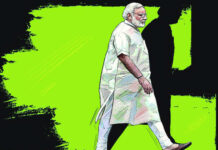The Swadeshi Jagran Manch believes the programme will divert scarce resources from more worthwhile health initiatives.
The Union health ministry has decided to shelve cervical cancer vaccination, which was to be introduced under India’s Universal Immunisation Programme (UIP). The decision calls for a debate as cervical cancer is the second most common cancer among Indian women and the past experience of cervical cancer vaccination went kaput. But what is more worrisome is the fact that the decision was taken after a nudge by the economic wing of the RSS, the Swadeshi Jagran Manch (SJM) while a National Technical Advisory Group on Immunisation (NTAGI), which provides guidance to national policymakers, had proposed the vaccine.
Why RSS is against it?
According to reports, SJM national co-convener Ashwani Mahajan wrote a letter to Prime Minister Narendra Modi in December, explaining why the government should not spend money for a vaccine of doubtful utility. “It is our concern that this programme will divert scarce resources from more worthwhile health initiatives diverting it to this vaccine of doubtful utility and that its adverse effects will erode confidence in the national immunisation programme and thereby expose children unnecessarily to the risk of more serious vaccine-preventable disease,” he wrote.
“Swadeshi Jagran Manch requests you to stop this move to introduce Human Papilloma Virus (HPV) vaccine in India and we recommend the strongest action against groups that pervert science, which brings ignominy to the scientific community in the country and sells the country to vested interests,” the letter added.
HPV is a group of viruses, transmitted through sexual intercourse, can cause penile cancer in men, and cervical, vaginal, anal and vulvar cancer in women. It can also lead to throat or rectum cancer in both men and women.
Cervical cancer vaccination is not worthwhile?
According to WHO, India can introduce HPV (Human Papilloma Virus) vaccine as cervical cancer has surpassed other maternal mortality causes in the country. Speaking to The Indian Express, Dr Soumya Swaminathan, deputy director-general (programmes) of WHO said India should introduce the HPV vaccine in its public health programme. It is a WHO recommendation that all countries should do so and awareness about the vaccine is actually low. People do not always relate to this concept of cancer that is vaccine preventable. Cervical cancer is now killing about 70,000 women every year, more than other causes of maternal mortality. India should look at indigenous screening technologies and the vaccine together if it wants to eliminate cervical cancer. The two will protect different generations of women.
Why HPV vaccination is of “doubtful utility”?
The doubt is not an India-specific issue. It persists globally as the vaccination involves school-going girls who, in many cases, reported illness which are often attributed to the vaccine. The doses are costly and the impact can be seen only after at least 20 years. There are many types of HPV and the effectiveness of the vaccination against all these types of viruses is yet to be proved globally. Incidents of serious side effects, including nausea and dizziness, have also been reported by global media.
According to WHO guidelines, the vaccine is supposed to be given to young girls aged between nine and 13 years, before they become sexually active. Women up to age of 26 can take the vaccination, but it will be costly for them.
Andhra Pradesh and Gujarat had started cervical cancer control programme on a two-year trial basis. Several deaths were reported, which led to immediate suspension of the programme. It was also feared that the vaccination would create unnecessary fear among children. In 2013, the Supreme Court rapped the Centre for not being able to ensure foolproof clinical trials in India. Delhi and Punjab governments restarted the vaccination programmes from November 2016.
The concerns raised over the feasibility of the vaccination programme are legitimate. But the proposal can’t be just turned down as it failed once in 2010. The issue needs more clinical research, medical consultation, but surely no intervention from the economic wing of the RSS. #KhabarLive






